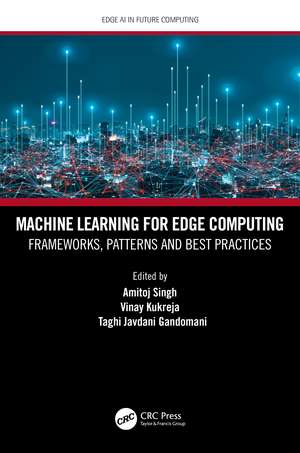Machine Learning for Edge Computing: Frameworks, Patterns and Best Practices: Edge AI in Future Computing
Editat de Amitoj Singh, Vinay Kukreja, Taghi Javdani Gandomanien Limba Engleză Hardback – 29 iul 2022
The target audience of this book includes academics, research scholars, industrial experts, scientists, and postgraduate students who are working in the field of Internet of Things (IoT) or edge computing and would like to add machine learning to enhance the capabilities of their work.
This book explores the following topics:
- Edge computing, hardware for edge computing AI, and edge virtualization techniques
- Edge intelligence and deep learning applications, training, and optimization
- Machine learning algorithms used for edge computing
- Reviews AI on IoT Discusses future edge computing needs
Vinay Kukreja is a Professor at the Chitkara Institute of Engineering and Technology, Chitkara University, Punjab, India.
Taghi Javdani Gandomani is an Assistant Professor at Shahrekord University, Shahrekord, Iran.
| Toate formatele și edițiile | Preț | Express |
|---|---|---|
| Paperback (1) | 541.28 lei 43-57 zile | |
| CRC Press – 29 iul 2024 | 541.28 lei 43-57 zile | |
| Hardback (1) | 675.54 lei 43-57 zile | |
| CRC Press – 29 iul 2022 | 675.54 lei 43-57 zile |
Preț: 675.54 lei
Preț vechi: 844.42 lei
-20% Nou
Puncte Express: 1013
Preț estimativ în valută:
129.31€ • 140.50$ • 108.69£
129.31€ • 140.50$ • 108.69£
Carte tipărită la comandă
Livrare economică 21 aprilie-05 mai
Preluare comenzi: 021 569.72.76
Specificații
ISBN-13: 9780367694326
ISBN-10: 0367694328
Pagini: 200
Ilustrații: 27 Tables, black and white; 26 Line drawings, black and white; 10 Halftones, black and white; 36 Illustrations, black and white
Dimensiuni: 156 x 234 x 13 mm
Greutate: 0.46 kg
Ediția:1
Editura: CRC Press
Colecția CRC Press
Seria Edge AI in Future Computing
ISBN-10: 0367694328
Pagini: 200
Ilustrații: 27 Tables, black and white; 26 Line drawings, black and white; 10 Halftones, black and white; 36 Illustrations, black and white
Dimensiuni: 156 x 234 x 13 mm
Greutate: 0.46 kg
Ediția:1
Editura: CRC Press
Colecția CRC Press
Seria Edge AI in Future Computing
Cuprins
1. Fog Computing And Its Security Challenges. 2. Machine Learning for Edge Computing: Frameworks, Patterns and Best Practices. 3. Tea Vending Machine from extracts of Natural Tea leaves and other ingredients: IoT and Artificial Intelligence Enabled. 4. Recent Trends in OCR Systems: A Review. 5. A Novel Approach for Data Security using DNA Cryptography with Artificial Bee Colony Algorithm in Cloud Computing. 6. Various Techniques for Consensus Mechanism in Blockchain. 7. IoT inspired Smart Healthcare Service for diagnosing remote patients with Diabetes. 8. Segmentation of Deep Learning Models. 9. Alzheimer’s disease Classification. 10. Deep learning applications on Edge computing. 11. Designing an Efficient Network based Intrusion Detection System using Artificial Bee Colony and ADASYN oversampling approach.
Notă biografică
Amitoj Singh is working as Assistant Professor in the department of Computational Sciences, MRSPTU, Bathinda, Punjab, India.
Vinay Kukreja is working as an Associate professor at Chitkara University, Punjab, India.
Taghi Javdani Gandomani is an Assistant Professor at Shahrekord University, Shahrekord, Iran.
Vinay Kukreja is working as an Associate professor at Chitkara University, Punjab, India.
Taghi Javdani Gandomani is an Assistant Professor at Shahrekord University, Shahrekord, Iran.
Descriere
This book divides edge intelligence into AI for edge (intelligence-enabled edge computing) and AI on edge (artificial intelligence on edge). It focuses on providing optimal solutions to the key concerns in edge computing through effective AI technologies, and it also discusses how to build AI models, i.e., model training and inference, on edge.











